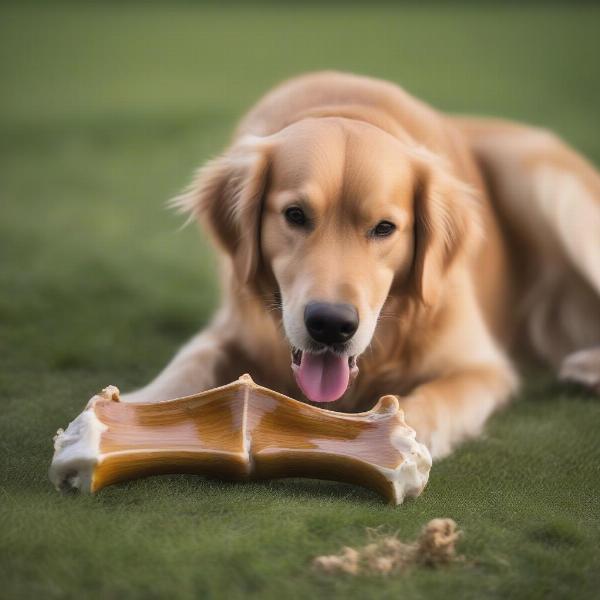Cow knuckle bones are a popular chew treat for dogs, often touted for their durability and ability to keep pups entertained. But are they truly a safe and beneficial option for your canine companion? This comprehensive guide delves into the pros and cons of cow knuckle bones for dogs, explores potential risks, and offers safe, healthy alternatives to keep your furry friend happy and healthy.
The Allure of Cow Knuckle Bones: Why Dogs Love Them
Dogs have a natural instinct to chew, and a large, meaty bone like a cow knuckle can provide hours of satisfying gnawing.  Dog gnawing on a bone This chewing action helps clean their teeth, strengthens jaw muscles, and provides mental stimulation, combating boredom and anxiety. The marrow inside the bone is also a tasty treat, offering a rich source of nutrients. Many owners appreciate the long-lasting nature of knuckle bones, making them a seemingly cost-effective option compared to other chews.
Dog gnawing on a bone This chewing action helps clean their teeth, strengthens jaw muscles, and provides mental stimulation, combating boredom and anxiety. The marrow inside the bone is also a tasty treat, offering a rich source of nutrients. Many owners appreciate the long-lasting nature of knuckle bones, making them a seemingly cost-effective option compared to other chews.
Potential Hazards: When Knuckle Bones Become a Concern
While cow knuckle bones can offer some benefits, they also present several potential risks. One of the most significant concerns is the potential for broken teeth. The hard bone can fracture a dog’s teeth, leading to painful dental emergencies. Splintering is another serious risk. As the bone is gnawed, sharp fragments can break off and be swallowed, potentially causing gastrointestinal blockages, perforations, or irritation. Contamination is also a concern, especially with raw bones. Bacteria like Salmonella and E. coli can be present and pose a health risk to both dogs and their owners.
Safe Chewing Practices: Minimizing the Risks
If you choose to give your dog a cow knuckle bone, certain precautions can help minimize the risks. Always supervise your dog while they are chewing. Remove the bone once it becomes small enough to be swallowed whole. Consider offering the bone only occasionally, as part of a balanced chewing regime. Avoid cooked bones entirely, as they are more prone to splintering.
Healthy Alternatives: Keeping Chews Safe and Fun
Fortunately, there are many safer and equally enjoyable alternatives to cow knuckle bones. Dental chews designed to promote oral health are a great option. Rubber toys can provide satisfying chewing action and can be filled with treats for added engagement. Bully sticks, while requiring careful supervision, are a digestible and flavorful option. Always choose chews that are appropriately sized for your dog’s breed and chewing habits.
What About Marrow Bones?
Marrow bones, often confused with knuckle bones, present similar risks. While the marrow itself is nutritious, the hard bone can still pose a threat to dental health and the digestive system. Exercise caution and supervision if you choose to offer marrow bones.
Making the Right Choice for Your Canine Companion
Ultimately, the decision of whether or not to give your dog a cow knuckle bone is a personal one. Weigh the potential benefits against the risks, and prioritize your dog’s safety and well-being. By understanding the potential hazards and exploring the many safe alternatives available, you can ensure your furry friend enjoys a healthy and happy chewing experience.
Conclusion: Prioritizing Safety and Enjoyment
Cow knuckle bones can be a source of enjoyment for dogs, but they’re not without risks. Prioritize your dog’s health by understanding these potential hazards and exploring safer alternatives. Remember to always supervise chewing sessions and consult with your veterinarian for personalized advice. By making informed choices, you can ensure your dog’s chewing habits remain a source of fun and enrichment without compromising their well-being.
FAQ: Addressing Common Concerns
- Are cooked cow knuckle bones safe for dogs? No, cooked bones are more brittle and prone to splintering, posing a significant risk to your dog’s digestive system.
- How can I tell if a bone is too hard for my dog? If you can’t make an indentation in the bone with your fingernail, it’s likely too hard for your dog.
- What should I do if my dog swallows a bone fragment? Contact your veterinarian immediately.
- Are there any benefits to chewing for dogs? Chewing helps clean teeth, strengthens jaws, and provides mental stimulation.
- What are some good alternatives to cow knuckle bones? Dental chews, rubber toys, and bully sticks are safer options.
- How often should I give my dog a chew treat? This depends on your dog’s individual needs and the type of chew. Consult your veterinarian for guidance.
- Can puppies have cow knuckle bones? No, puppies have developing teeth and are more susceptible to dental damage from hard bones.
Related Articles on ILM Dog:
ILM Dog is your trusted global resource for expert dog care advice. We offer practical guidance on every aspect of canine companionship, from breed selection and puppy care to senior dog health, nutrition, training, and product reviews. We empower dog owners worldwide with the knowledge and resources they need to provide the best possible care for their beloved pets. For personalized advice or any dog-related questions, reach out to our experts at [email protected] or call us at +44 20-3965-8624. ILM Dog is here to support you and your furry companion on every step of your journey together.